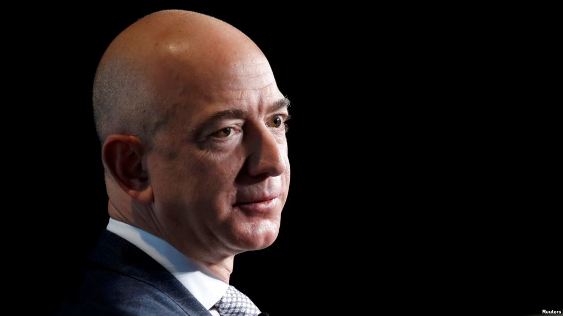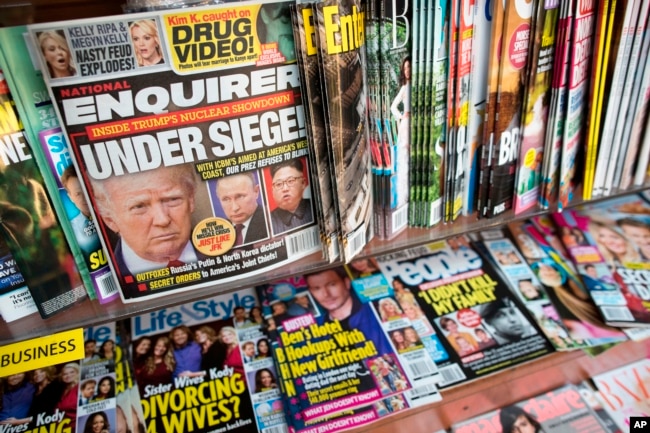
Bezos Allegations Against US Tabloid Tests Limits of Press Freedom
VOA News/Brian Padden
WASHINGTON — Accusations of extortion and blackmail made by the world’s richest man against a national gossip newspaper may have breached the legal limits of broad press freedoms protected by the First Amendment of the U.S. Constitution.
Jeff Bezos, the world’s richest man, who owns both the Amazon online shopping site and The Washington Post newspaper, recently claimed that the publishers of the National Enquirer newspaper’s parent company, American Media Inc. (AMI), threatened to publish intimate photos of Bezos unless he halted an investigation into the tabloid’s aggressive coverage of his divorce.
The Amazon founder, who is reportedly worth $136 billion, said he would “spare no expense” to investigate how the Enquirer obtained his private text messages that were published in a story alleging an extramarital affair with former news anchor Lauren Sanchez before announcing his divorce from his wife of 25 years.
Legal liability
AMI has denied the charges and maintains it acted lawfully in its reporting.
“It absolutely is not extortion and not blackmail. What happened was the story was given to the National Enquirer by a reliable source that had given information to the National Enquirer for seven years prior to this story. It was a source that was well-known to both Mr. Bezos and Miss Sanchez,” said Elkan Abramowitz, an attorney representing AMI.
There have been media reports speculating that Michael Sanchez, the brother of Lauren Sanchez, may have provided the Bezos texts to the Enquirer.
Legal hot water
However, AMI chairman and CEO David Pecker and the media conglomerate could be in legal jeopardy if Bezos’ blackmail allegations can be proved, or if the Enquirer is found to have been directly involved in stealing private text messages.
“I don’t quite understand why AMI and its lawyers engaged in activity that potentially violates federal extortion laws and state criminal laws involving coercion. And potentially, depending on how they got the information, the Computer Fraud and Abuse Act, which is an anti-federal, anti-hacking law,” said Tor Ekeland, a federal criminal defense lawyer.
Last year, Pecker admitted that before the 2016 election, AMI paid $150,000 to former Playboy model Karen McDougal to silence her allegations of an affair with Trump. The publishers avoided prosecution by agreeing to cooperate with federal prosecutors investigating campaign finance violations. Prosecutors are now looking into whether the Bezos extortion allegations violate the previous deal that was conditional on AMI not committing further crimes.
Partisan press
The Bezos investigation is also looking into the possible political motivations behind the Enquirer’s extensive coverage, which according to the Enquirerentailed sending reporters to follow Bezos and Sanchez “across five states and 40,000 miles,” and tracking them “in private jets, swanky limos, helicopter rides.”
Bezos suggested he may have been targeted by the Enquirer in retaliation for TheWashington Post’s critical coverage of President Donald Trump, and of Saudi Crown Prince Mohammed bin Salman’s alleged involvement in the killing of Saudi dissident and Post columnist Jamal Khashoggi.
Trump has often criticized Amazon, The Washington Post and Bezos on Twitter, calling the newspaper “the Amazon Washington Post,” and its owner, “Bozo.”
Pecker, a longtime friend of Trump, reportedly also has ties to leaders in Saudi Arabia.
The White House and Saudi officials have denied any knowledge or involvement in the Enquirer coverage.
Press freedom
Bezos may find little legal recourse against charges he is being politically targeted by a media organization aligned with Trump.
The Enquirer’s salacious reporting on Bezos’ alleged affair, even if done for overtly partisan reasons, would likely be protected under the First Amendment.
“I have to separate out the sleaze here from the principle I think we’re trying to protect, which is, journalists have a right to publish what they know,” said Gene Policinski, director of the Freedom Forum Institute’s First Amendment Center.
And news organizations in the United States have a long history of political partisanship, of aligning with political parties and targeting opposition groups with more critical coverage.
“Political partnership, again, is part of our marketplace of ideas. It is part of what we’ve always accepted in the idea of, if you don’t like it, you can publish your own. Government stays out of the way,” Policinski said.
Bezos could also pursue a civil suit against AMI, but public figures have to cross a higher threshold to prove defamation in U.S. courts.


